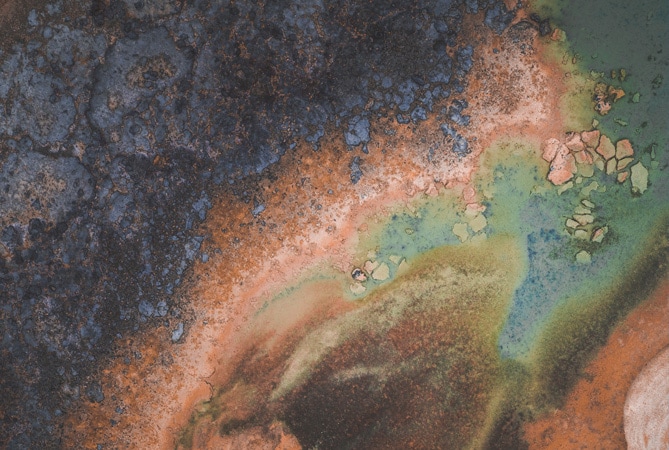Travel is becoming more feasible again, but it has become quite apparent that there's no going back to the world as it was before COVID19, and that travel methods must change to suit the needs of this 'new normal' era. Social distancing must be practiced among people, and maintaining proper hygiene, and sanitized environments have become all-important. The sight of stunning natural scenery has become a welcome consolation for those weary from the woes of recent years.
The pandemic has taught us that geographical distance is no longer important in a virtual world. The latest technological advancements have even brought us virtual travel, allowing people to instantly visit anywhere, from remote idyllic villages to the deep ocean, and even space stations with a view of the whole Earth. The ability to render ever-more realistic and lifelike scenery has blurred the boundary between the real and the virtual, continuing to expand the possibilities for new forms of travel.
There are few kinds of travel experiences as romantic and luxurious as winery tours. Although wineries in Germany are not as well-known as those in France or Italy, this only adds to the unexpected pleasure and amazement of those visiting. There are a total of 13 wine-producing regions in Germany. One of these, the Rheingau, is situated along the winding path of the Rhine river. While it is among the smallest wine-producing regions in terms of area, the Rheingau is in fact the oldest, and has long been the home of very high-end wines. It is also the biggest grower of Germany's best-known grape variety - the Riesling.
Most German wine is produced along the banks of the Moselle and the Rhine. The Rhine, which flows from the south to the north, takes a capricious turn near Mainz. It then follows a easterly path from Eltville to Oestrich Winkel, Rüdesheim, and Assmannshausen before bending again to the north of Lorch. The vineyards situated along the hills to the north of the Rhine make up the Rheingau. Its steep hills make for striking and unique scenery. The landscape is dotted with ancient monasteries and castles, and sometimes villages made up of traditional wooden homes. This 120km-long path is known as the Riesling Route.
No visit to the Rheingau would be complete without a taste of the finest Riesling, but the region also offers much more to enjoy. Each morning, visitors staying at vineyards' guesthouses can bask in the scenery of the surrounding grape fields. They can also visit the old wineries built atop the ruins of medieval monasteries for wine tastings. Other activities include meeting and chatting with the various experts involved in winemaking such as grape growers, technicians, sommeliers, and cellar masters. Afterwards, they can retreat to one of the restaurants overlooking the vineyards to enjoy fine wine and dining. As a travel destination, the Rheingau and its wineries truly offer “healing through all five senses.”
The Rheingau is also home to various delectable culinary and cultural festivals that draw inspiration from the region's rich history and art. One example is the Rheingau Musik Festival, one of Europe's most beloved music festivals. LG SIGNATURE was a main sponsor for this year's event. The Rheingau’s culture and music came together with LG SIGNATURE’s technology to create a truly unique and synergetic experience for participants.
Envision being instantly transported to the Rheingau's vineyards. The LG SIGNATURE OLED 8K, with its expansive 222cm screen and ultra-high resolution, brings such visions closer to reality. The Real OLED 8K, with its 130 million sub-pixels allows the beauty of the Rheingau's scenery to be enjoyed in unprecedented quality. The viewer is almost tempted to pick at the hanging grapes, rendered with lifelike clarity and detail, and soon finds themselves standing among the vines of the Rheingau.
Whereas the splendor of the Rheingau's vineyards is the result of constant care and tending the stunning natural scenery of Shark Bay in Western Australia has retained its pristine, primordial state Through ages. This fascinating and exotic destination is where some of the planet's most ancient creatures still thrive today.
Shark Bay is best known for its colony of stromatolites - one of Earth's oldest life forms responsible for introducing oxygen to this planet eons ago. Today, these creatures can be found in only two places in the world: Shark Bay's Hamelin Pool and Greenland. Shark Bay is one of the only coastal areas in the world with no reefs, and is home to the world's largest seagrass beds. It is also a key habitat for dugongs, a type of sea cow, as well as 26 more of Australia's endangered mammals.
A remote wilderness that is almost completely devoid of lights, Shark Bay is a space that is perceived wholly in terms of monotone darkness and brightness - from pitch black to grey regions to patches of white. While Shark Bay’s magnificent night sky of is a view to be remembered for a lifetime, visiting in person, so far away from civilization and surrounded by utter darkness, can be a daunting experience. The LG SIGNATURE OLED 8K replicates the stunning views of this night journey from the comfort of your own home. The true black-enabled OLED 8K can display Shark Bay's monotone world with astounding fidelity due to its ability to express infinite contrast. The display's finely controlled lights clearly define every star dotting the dark expanse above, capturing Shark Bay’s wild night sky with unmatched realism.
Anticipation for the resumption of travel is higher than ever before. It should be noted, however, that transitioning to an age of 'living with coronavirus' calls for the fullest sense of responsibility. We are now entering an era where all travelers must be more mindful of sustainability. This means we must take care to protect nature and animals, while also being respectful of the people and communities living in our travel destinations. To ensure that the natural wonders we visit remain accessible to future generations, we must be more responsible and considerate as travelers. The privilege to travel again, so hard-earned in the wake of the COVID-19 pandemic, demands no less.














